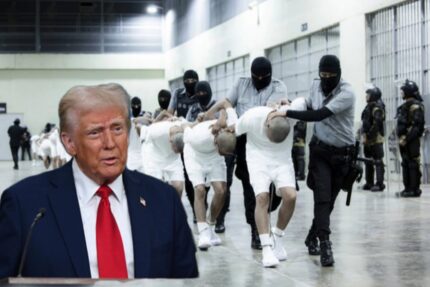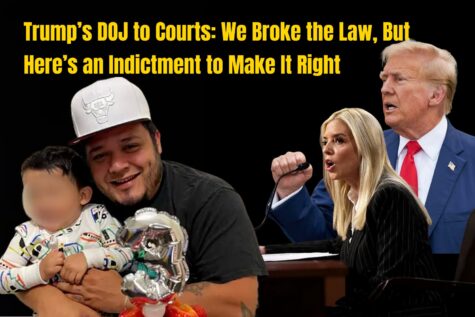The Donald Trump administration has intensified its crackdown on alleged gang members by deporting 17 individuals to El Salvador’s notorious Terrorism Confinement Center (Cecot). The deportees, mostly Venezuelan and Salvadoran nationals, were transferred from immigration detention at Guantánamo Bay, a White House official confirmed on Monday.
U.S. Secretary of State Marco Rubio justified the overnight military transfer, labeling the deportees as “murderers and rapists” affiliated with the Tren de Aragua and MS-13 gangs, which the Donald Trump administration recently designated as foreign terrorist organizations. However, human rights advocates and family members argue that some individuals were wrongly classified as criminals without due process.
Legal Challenges and the Use of the Alien Enemies Act
The deportations have been met with legal resistance, with civil rights groups questioning their constitutionality. A federal judge previously ruled against the use of the 18th-century Alien Enemies Act, which the administration cited as justification for mass removals. The American Civil Liberties Union (ACLU) and other organizations argue that the act has historically been used only in wartime and that the deported individuals were denied proper hearings.
Despite the court’s restraining order, deportation flights continued. Legal experts claim the Trump administration has pivoted to general immigration laws to sidestep legal roadblocks, but the matter remains under intense judicial scrutiny, with a key hearing scheduled for Thursday.
Human Rights Concerns and Family Appeals
El Salvador’s President Nayib Bukele publicly supported the deportations, posting a video on social media showing shackled deportees arriving at Cecot, their heads shaved before being confined to prison cells.
Bukele emphasized that all individuals were “confirmed murderers and high-profile offenders, including six child rapists.” Trump echoed this sentiment, thanking Bukele and criticizing the Biden administration for allegedly allowing these individuals into the U.S.
However, family members and attorneys have disputed the gang affiliations of some deportees. One notable case involves a 23-year-old Venezuelan makeup artist who was mistakenly identified as a gang member due to misinterpreted tattoos. His attorney, Lindsay Toczylowski, revealed that he had a pending immigration court appearance in the U.S. before his abrupt deportation.
Diplomatic Agreements and Financial Incentives
El Salvador has reportedly agreed to accept deportees in exchange for a $6 million aid package from the U.S. government. While the Trump administration justifies this as part of its broader anti-gang strategy, critics argue that it incentivizes the detention and deportation of individuals without proper legal review.
This financial agreement follows a pattern of controversial U.S. migration deals with Central American nations, where concerns about prison conditions and potential human rights abuses persist. Reports indicate that the Cecot prison, known for its harsh conditions, has been used as a tool to assert control over criminal networks, raising ethical concerns about whether deported individuals will receive fair trials or humane treatment.
Future of Donald Trump’s Immigration Crackdown
The Donald Trump administration remains steadfast in its commitment to mass deportations despite mounting legal battles. Intelligence agencies have reportedly challenged Donald Trump’s claims that the Tren de Aragua gang has direct ties to the Venezuelan government, undermining a key justification for the deportations.
The White House has petitioned the U.S. Supreme Court to lift legal restrictions on the use of wartime deportation powers, signaling an ongoing battle over the Trump administration’s hardline immigration policies. As the legal and political debates intensify, the fate of thousands of detained migrants hangs in the balance, raising significant questions about due process, human rights, and the broader implications of these deportation policies.














